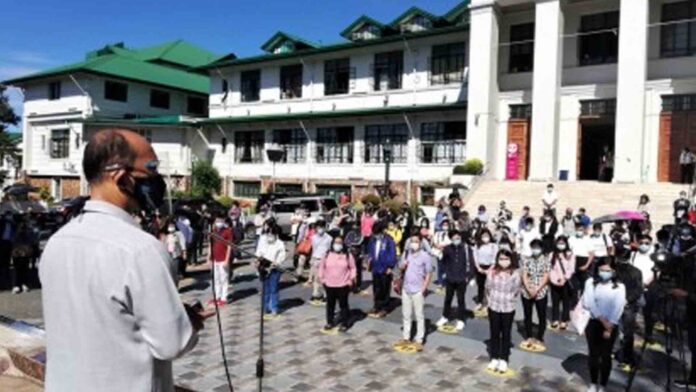This city would be the first local government unit (LGU) in the country to use the services of the Department of the Interior and Local Government (DILG)-hired contact tracers whose salaries would be sourced from funds provided in the Bayanihan to Recover as One Act.
In an interview Monday, Evelyn Trinidad, DILG Baguio director, said the city was allotted the most number of contact tracers in the region with 176.
Out of 700 applicants, only 400 have undergone interview as many of them lack requirements set by the DILG central office on the hiring of contact tracers.
“They were ranked and those who belong to the top 176 are those who are here and will start working tomorrow (Tuesday),” Trinidad said.
The hired contact tracers are composed of fresh graduates, displaced workers, and some former overseas Filipino workers (OFW) who are graduates of medical and allied medical courses, criminology, and Information technology.
Trinidad said they have undergone training using modules made by those who have experience in contact tracing such as Mayor Benjamin Magalong and doctors of the city’s Health Services Office.
“We are lucky we have resource speakers available locally,” she said.
The training was composed of policies related to contact tracing, steps in contact tracing, and cognitive interviewing skills.
“Cognitive interviewing skills is a part of the steps of contact tracing and a very critical one,” she said.
The skills will help the patient remember data, events, and activities done which will be material in a successful contact tracing.
The new contact tracers will receive PHP18,737 basic salary until December 31, as well as transportation allowance and a communication allowance.
“If they perform well an additional 5 percent premium will be added to their monthly salary,” she added.
During their oath-taking on the sidelines of the flag-raising ceremony of the city government on Monday, Magalong told the contact tracers to perform their job well.
“Your ultimate objective as contact tracers are to save more lives, to keep our community safe, and to keep yourselves safe and healthy to be able to perform the first two goals.”
So far, Magalong said only two out of 80 core members of the city’s contact tracing team have been infected with coronavirus disease 2019 (Covid-19) since their work started in March.
“I don’t want anyone among you to be part of that statistics so you need to be very careful. Always think about safety. I wish you all the best. Pagbutihin nyo (do your best),” Magalong said.
The 176 contract tracers are the first batch of the 50,000 contact tracers who will be hired nationwide.
Magalong said there are 16 medical officers and 80 core contact tracers who will mentor the new recruits.
“We have enough to mentor them, to guide them, support them,” he said.
He added that contact tracing plays a vital role in the decision-making process of local government units in responding to the pandemic.
He said the city is able to trace about 80 to 90 percent of the close contacts of Covid-19 positive patients who are also subjected to swab test.
“The more you test, the higher you perform. If you reach your contact tracing efficiency ratio, talagang dadami ang kaso (your cases will increase). What is important is you get the real situation on the ground, you get the real figure, mas mataas ang (the higher your) situational awareness mo so iyong (your) tactical action strategic decisions will be more responsive to the prevailing situation,” he said.
The mayor said Baguio is using contact tracers to gather information. Such information is fed to the information technology (IT) application which will help analyze the data and provide the decision makers with the correct situation.
Magalong said the IT application system the city uses is the same as the crime information research and analysis system (CIRAS) used by the Philippine National Police but was simply changed with Covid information. The system was developed by the Police Regional Office Cordillera (PROCOR) when Magalong was regional director and was later adopted by the Philippine National Police (PNP) nationwide.
They are also using the crime management and analysis system (CMAS) which is a link analysis developed by the Criminal Investigation and Detection Group (CIDG) when he was chief of the unit that allowed them to track high profile cases.
Magalong said that putting both human resource and technology hand-in-hand is allowing the city to have a better glimpse of its Covid-19 situation. (PNA)






